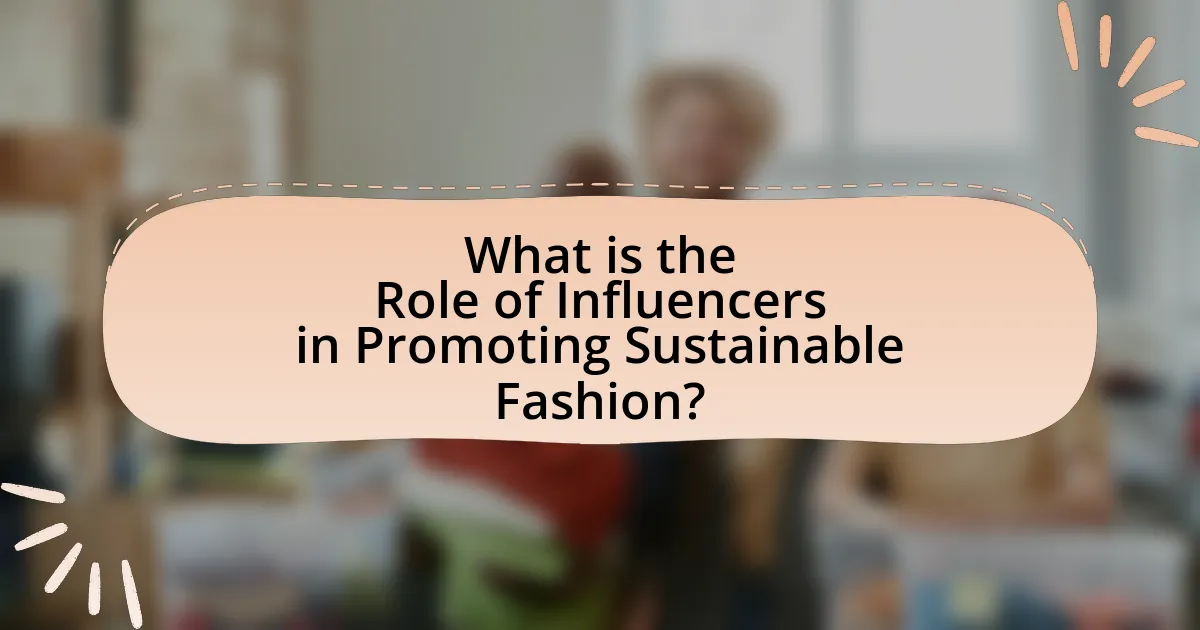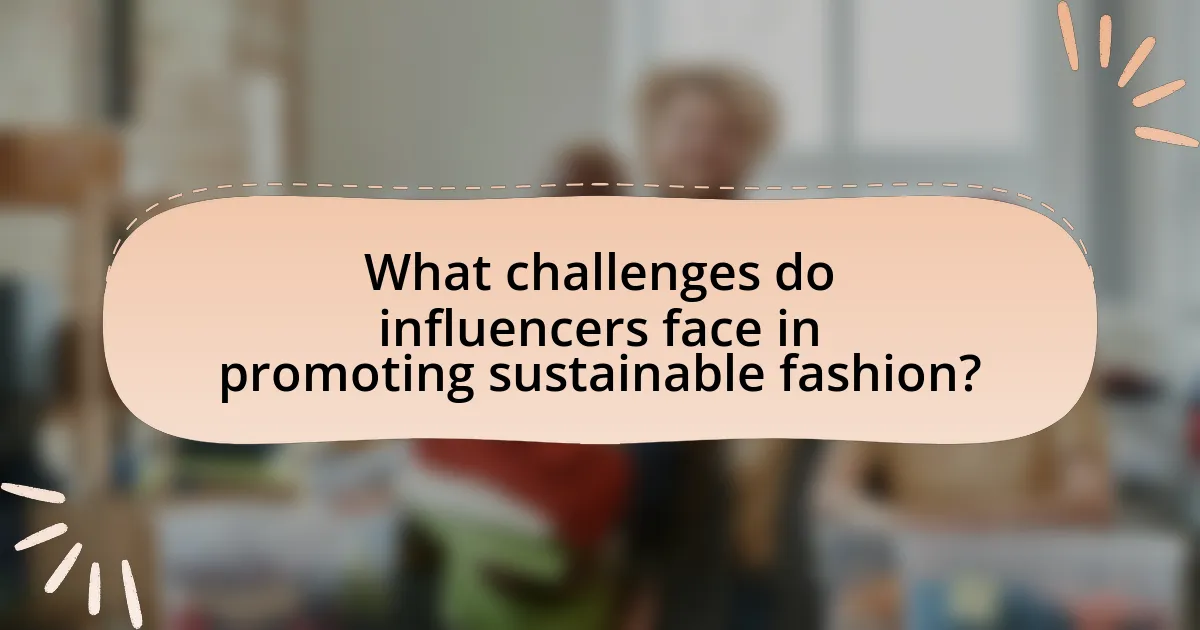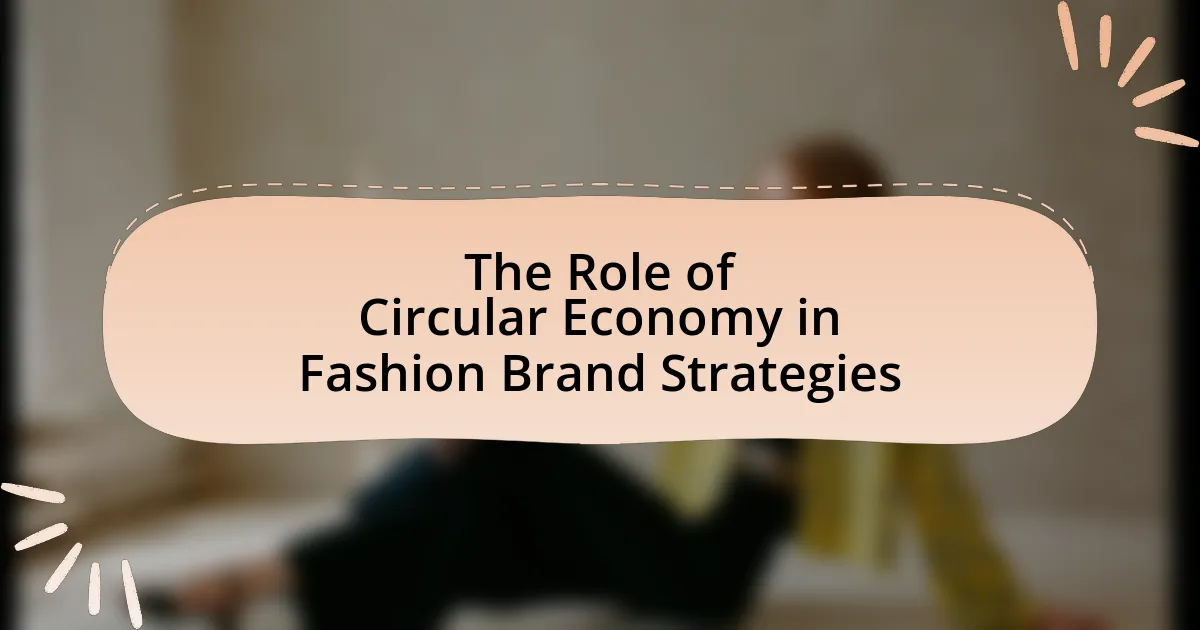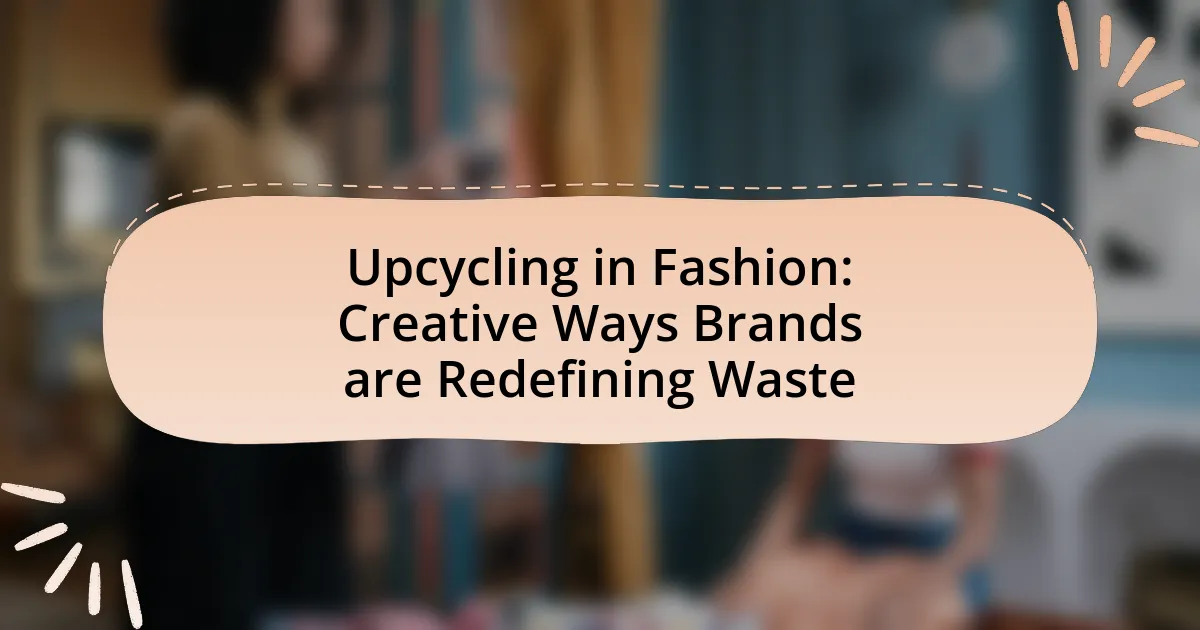The article examines the significant role of influencers in promoting sustainable fashion, highlighting their ability to raise awareness and influence consumer behavior towards eco-friendly practices. It discusses how influencers impact purchasing decisions, the strategies they employ to promote sustainable brands, and the importance of authenticity in building consumer trust. Additionally, the article addresses the challenges influencers face, such as consumer skepticism and the balance between commercial interests and sustainability. It also explores the effectiveness of social media platforms in enhancing influencer marketing for sustainable fashion and provides practical tips for influencers to effectively advocate for eco-friendly practices.

What is the Role of Influencers in Promoting Sustainable Fashion?
Influencers play a crucial role in promoting sustainable fashion by leveraging their platforms to raise awareness and drive consumer behavior towards eco-friendly practices. They utilize their reach and credibility to educate followers about the environmental impacts of fast fashion and advocate for sustainable brands. For instance, a study by the University of Southern California found that social media influencers significantly affect consumer purchasing decisions, with 49% of consumers relying on influencer recommendations for their buying choices. This demonstrates that influencers can effectively shift consumer preferences towards sustainable options, thereby fostering a more environmentally conscious fashion industry.
How do influencers impact consumer behavior in sustainable fashion?
Influencers significantly impact consumer behavior in sustainable fashion by shaping perceptions and driving purchasing decisions. Their ability to reach large audiences through social media platforms allows them to promote sustainable brands and practices effectively. For instance, a study published in the Journal of Business Research found that consumers are more likely to purchase sustainable fashion items when endorsed by influencers they trust, as these endorsements enhance credibility and relatability. Additionally, influencers often share personal stories and experiences related to sustainability, which resonate with their followers and encourage them to adopt similar values. This influence is further supported by the fact that 70% of millennials are more likely to buy from brands that are endorsed by influencers, highlighting the direct correlation between influencer marketing and consumer behavior in the sustainable fashion sector.
What strategies do influencers use to promote sustainable fashion brands?
Influencers promote sustainable fashion brands through authentic storytelling, engaging content, and strategic partnerships. By sharing personal experiences and the values behind sustainable fashion, influencers create a relatable narrative that resonates with their audience. They often utilize visually appealing content on platforms like Instagram and TikTok to showcase sustainable products in real-life settings, enhancing their appeal. Additionally, influencers collaborate with brands for exclusive collections or campaigns, leveraging their reach to amplify brand messages. Research indicates that 70% of consumers trust influencers more than traditional advertisements, highlighting the effectiveness of influencer marketing in driving awareness and sales for sustainable fashion brands.
How does influencer authenticity affect consumer trust in sustainable fashion?
Influencer authenticity significantly enhances consumer trust in sustainable fashion. When influencers genuinely align with sustainable practices and transparently share their values, consumers are more likely to perceive them as credible sources. Research indicates that 70% of consumers are more likely to trust influencers who demonstrate authenticity through personal experiences and consistent messaging about sustainability. This trust is crucial, as it influences purchasing decisions; consumers often seek validation from influencers who they believe genuinely support sustainable fashion, leading to increased brand loyalty and sales for eco-friendly products.
Why is influencer marketing significant for sustainable fashion brands?
Influencer marketing is significant for sustainable fashion brands because it effectively reaches and engages target audiences who prioritize ethical consumption. Influencers possess the ability to authentically communicate the values of sustainability, thereby fostering trust and credibility among consumers. Research indicates that 70% of millennials are influenced by the recommendations of their peers, including social media influencers, when making purchasing decisions. This demographic is particularly concerned with sustainability, making influencer partnerships a strategic approach for brands to enhance visibility and promote eco-friendly practices.
What advantages do influencers provide to sustainable fashion brands?
Influencers provide significant advantages to sustainable fashion brands by enhancing brand visibility and credibility. They leverage their established audiences to promote sustainable practices and products, effectively reaching consumers who prioritize ethical consumption. Research indicates that 49% of consumers rely on influencer recommendations when making purchase decisions, highlighting the persuasive power influencers hold. Additionally, influencers can create engaging content that educates their followers about sustainability, fostering a deeper understanding and appreciation for eco-friendly fashion choices. This engagement not only drives sales but also cultivates a community around sustainable fashion, amplifying the brand’s message and mission.
How do influencers help raise awareness about sustainability in fashion?
Influencers raise awareness about sustainability in fashion by leveraging their platforms to promote eco-friendly brands and practices. They often share content that highlights sustainable materials, ethical production processes, and the importance of reducing waste, thereby educating their followers. For instance, a study by the University of Southern California found that 70% of consumers are influenced by social media when making purchasing decisions, indicating that influencers can significantly impact consumer behavior towards sustainable choices. Additionally, influencers frequently collaborate with sustainable fashion brands, amplifying their reach and encouraging their audience to consider the environmental impact of their fashion choices.

What challenges do influencers face in promoting sustainable fashion?
Influencers face several challenges in promoting sustainable fashion, primarily including consumer skepticism, limited brand partnerships, and the pressure to maintain aesthetic appeal. Consumer skepticism arises from doubts about the authenticity of sustainability claims, as many consumers question whether influencers genuinely support sustainable practices or are merely capitalizing on a trend. Limited brand partnerships occur because not all fashion brands prioritize sustainability, making it difficult for influencers to find suitable collaborations that align with their values. Additionally, influencers often feel pressured to present visually appealing content, which can conflict with the less glamorous aspects of sustainable fashion, such as transparency about production processes and the environmental impact of clothing. These challenges hinder influencers’ ability to effectively advocate for sustainable fashion while maintaining their audience’s trust and engagement.
How do influencers navigate the balance between commercial interests and sustainability?
Influencers navigate the balance between commercial interests and sustainability by strategically selecting partnerships that align with their values and audience expectations. They often prioritize brands that demonstrate genuine commitment to sustainable practices, such as using eco-friendly materials or ethical labor practices. For instance, a study by the University of Southern California found that influencers who promote sustainable brands can enhance their credibility and audience trust, leading to increased engagement and sales. This approach allows influencers to maintain their authenticity while also generating revenue, effectively merging their commercial goals with a commitment to sustainability.
What ethical dilemmas do influencers encounter in sustainable fashion promotion?
Influencers encounter several ethical dilemmas in sustainable fashion promotion, primarily related to authenticity, transparency, and consumer manipulation. Authenticity issues arise when influencers promote brands that do not genuinely adhere to sustainable practices, potentially misleading their audience. Transparency is compromised when influencers fail to disclose paid partnerships or sponsorships, which can create distrust among followers. Additionally, influencers may inadvertently contribute to consumerism by promoting new sustainable products, contradicting the core principle of sustainability, which emphasizes reducing consumption. These dilemmas highlight the complex responsibilities influencers face in aligning their promotional activities with ethical standards in sustainable fashion.
How can influencers overcome skepticism regarding their sustainability claims?
Influencers can overcome skepticism regarding their sustainability claims by providing transparent evidence of their practices and partnerships. By sharing detailed information about the sourcing, production processes, and certifications of the brands they promote, influencers can build trust with their audience. For instance, influencers can showcase third-party certifications like Fair Trade or Global Organic Textile Standard, which validate the sustainability of the products. Additionally, influencers can engage in storytelling that highlights their personal commitment to sustainability, such as sharing their journey towards eco-friendly choices. This approach not only demonstrates authenticity but also encourages followers to critically evaluate the sustainability of their own consumption habits.
What role does social media play in influencer marketing for sustainable fashion?
Social media serves as a crucial platform for influencer marketing in sustainable fashion by enabling influencers to reach and engage a wide audience effectively. Influencers utilize social media channels like Instagram, TikTok, and YouTube to showcase sustainable fashion brands, share eco-friendly practices, and promote conscious consumerism. According to a 2021 study by the Global Fashion Agenda, 62% of consumers are influenced by social media when making sustainable fashion choices, highlighting the significant impact of these platforms on consumer behavior. This engagement fosters a community around sustainability, amplifying the message and encouraging more individuals to consider sustainable options in their fashion choices.
Which social media platforms are most effective for promoting sustainable fashion?
Instagram and TikTok are the most effective social media platforms for promoting sustainable fashion. Instagram’s visual-centric approach allows brands to showcase eco-friendly products through high-quality images and influencer partnerships, reaching a large audience interested in sustainability. TikTok’s short-form video content enables creative storytelling and viral trends, making it an ideal platform for engaging younger consumers with sustainable fashion messages. According to a 2021 report by the Global Fashion Agenda, 62% of consumers are influenced by social media when making sustainable fashion choices, highlighting the significant impact these platforms have on consumer behavior.
How do engagement metrics influence the effectiveness of influencer campaigns?
Engagement metrics significantly influence the effectiveness of influencer campaigns by providing measurable insights into audience interaction and interest. High engagement rates, such as likes, comments, and shares, indicate that the content resonates with the audience, leading to increased brand awareness and potential conversions. For instance, a study by Influencer Marketing Hub found that campaigns with higher engagement rates can yield up to 11 times the ROI compared to those with lower engagement. This correlation demonstrates that effective influencer campaigns leverage engagement metrics to optimize content strategy, target the right audience, and ultimately drive sales in the sustainable fashion sector.

How can influencers effectively promote sustainable fashion?
Influencers can effectively promote sustainable fashion by showcasing eco-friendly brands and practices through authentic storytelling and engaging content. By sharing personal experiences with sustainable products, influencers can build trust and inspire their audience to make conscious purchasing decisions. Research indicates that 70% of consumers are more likely to purchase from brands that are endorsed by influencers they trust, highlighting the impact of influencer marketing on consumer behavior. Additionally, influencers can leverage social media platforms to educate their followers about the environmental benefits of sustainable fashion, thus driving awareness and encouraging a shift towards more responsible consumption.
What best practices should influencers follow when promoting sustainable fashion?
Influencers should prioritize transparency and authenticity when promoting sustainable fashion. This involves clearly disclosing partnerships with brands and ensuring that the products they endorse genuinely align with sustainable practices, such as ethical sourcing and eco-friendly materials. Research indicates that consumers are more likely to trust influencers who provide honest information about their collaborations and the sustainability of the products they promote. For instance, a study by the Digital Marketing Institute found that 86% of consumers consider transparency important when making purchasing decisions. By adhering to these best practices, influencers can effectively contribute to the growth of sustainable fashion while maintaining their credibility.
How can influencers create authentic content that resonates with their audience?
Influencers can create authentic content that resonates with their audience by sharing personal stories and experiences related to sustainable fashion. This approach fosters a genuine connection, as audiences are more likely to engage with content that reflects real-life challenges and triumphs. For instance, influencers who discuss their journey towards sustainable fashion choices, including the impact of fast fashion on the environment, can effectively highlight the importance of conscious consumerism. Research indicates that 70% of consumers prefer brands that demonstrate authenticity, which reinforces the need for influencers to align their messaging with their values and lifestyle choices. By being transparent about their motivations and the brands they support, influencers can build trust and loyalty among their followers, ultimately enhancing the resonance of their content.
What partnerships can enhance an influencer’s impact in sustainable fashion?
Collaborations with sustainable brands, non-profit organizations, and eco-conscious platforms can significantly enhance an influencer’s impact in sustainable fashion. By partnering with sustainable brands, influencers can promote ethically produced clothing and accessories, thereby reaching audiences that value environmental responsibility. Collaborating with non-profit organizations focused on sustainability allows influencers to amplify awareness and drive engagement for important causes, such as reducing waste or supporting fair labor practices. Additionally, working with eco-conscious platforms can provide influencers with access to a broader audience interested in sustainable living, further solidifying their role as advocates for sustainable fashion. These partnerships not only increase visibility but also lend credibility to the influencer’s message, as they align with the values of sustainability and ethical consumption.
What are the future trends for influencers in sustainable fashion promotion?
Future trends for influencers in sustainable fashion promotion include a stronger emphasis on authenticity and transparency, as consumers increasingly demand genuine engagement with brands. Influencers will likely focus on showcasing sustainable practices, such as ethical sourcing and eco-friendly materials, to align with consumer values. Additionally, collaborations with sustainable brands will become more prevalent, as influencers seek to amplify their impact and reach. According to a 2022 report by McKinsey & Company, 67% of consumers consider sustainability when making fashion purchases, indicating a growing market for influencers who prioritize these values.
How might technology shape the influencer landscape in sustainable fashion?
Technology will significantly shape the influencer landscape in sustainable fashion by enhancing communication, engagement, and transparency. Social media platforms and advanced analytics tools enable influencers to reach wider audiences and tailor their messages to promote sustainable practices effectively. For instance, data from Statista indicates that as of 2023, over 4.7 billion people use social media, providing influencers with a vast network to advocate for eco-friendly brands and practices. Additionally, technologies like blockchain can improve transparency in supply chains, allowing influencers to share verified information about the sustainability of products, thereby building trust with their followers. This integration of technology not only amplifies the reach of sustainable fashion influencers but also fosters a more informed consumer base.
What emerging platforms could influence the future of sustainable fashion marketing?
Emerging platforms that could influence the future of sustainable fashion marketing include TikTok, Instagram Reels, and virtual reality (VR) environments. TikTok’s algorithm promotes viral content, allowing sustainable fashion brands to reach younger audiences quickly, as evidenced by the platform’s rapid growth to over 1 billion active users in 2021. Instagram Reels offers similar short-form video capabilities, enabling influencers to showcase sustainable fashion in engaging ways, which can lead to increased brand visibility and consumer engagement. Additionally, VR environments provide immersive experiences for consumers to explore sustainable fashion collections, enhancing emotional connections with brands. These platforms collectively leverage visual storytelling and community engagement, crucial for promoting sustainability in fashion.
What practical tips can influencers use to promote sustainable fashion effectively?
Influencers can effectively promote sustainable fashion by showcasing eco-friendly brands and practices through authentic storytelling. By sharing personal experiences with sustainable products, influencers can create a genuine connection with their audience, which is crucial for driving engagement. For instance, studies show that 70% of consumers are more likely to purchase from brands that align with their values, including sustainability. Additionally, influencers should utilize social media platforms to educate their followers about the environmental impact of fast fashion and the benefits of sustainable alternatives. Collaborating with sustainable brands for giveaways or challenges can also amplify their message and encourage audience participation.




